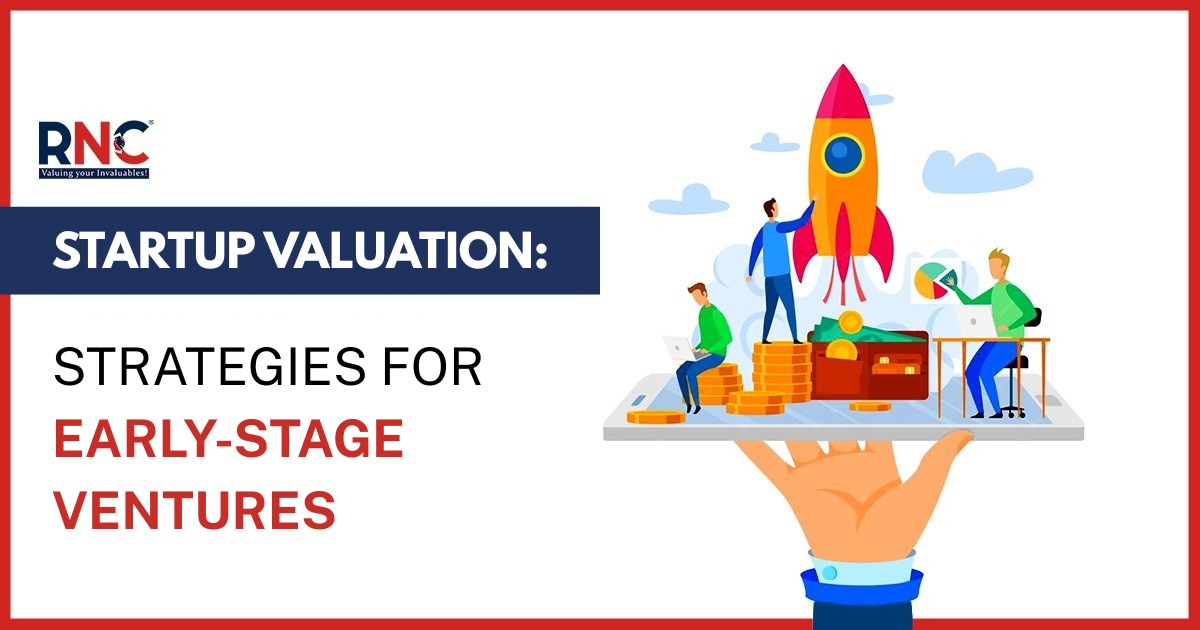
In the dynamic world of entrepreneurship, startup valuation plays a pivotal role in shaping a company’s future—from fundraising to equity structuring.
For early-stage ventures, understanding how your business is valued is not just a financial necessity but a strategic advantage that influences investor perception and deal-making.
Accurate company valuation helps founders confidently negotiate with angel investors, venture capitalists, and strategic partners, even in the absence of consistent revenues.
It also enables startups to gauge their market worth, plan for scalability, and decide when and how to raise funds or dilute equity.
Whether you’re preparing for your first funding round or structuring a new equity offer, investing in professional valuation services can ensure your startup is fairly and credibly represented in the market.
Understanding Startup Valuation
What is Startup Valuation?
Startup valuation is the process of assessing the financial worth of a newly established company. It estimates what a startup is worth at a given point, even if it has limited revenue or historical financial data.
This valuation plays a critical role in key decisions such as fundraising, equity allocation, partnership negotiations, and business exits. It helps founders and investors align expectations during early and growth stages.
Why is Valuation Crucial for Startups?
A credible startup valuation builds trust with investors and influences how much equity founders will need to give up for capital.
Key reasons why valuation matters:
-
- 💰 Investor Confidence: Shows readiness and business clarity.
- 📈 Equity Negotiation: Defines ownership stake for each funding round.
- 📊 Strategic Planning: Helps with setting budgets, projecting future performance, and defining key business objectives.
📋 Legal & Compliance: Important for issuing stock options, taxation, or regulatory filings.
Startup Valuation Methods in 2025
Comparison Table
| Method | Best For | Advantage | Limitation |
|---|---|---|---|
| Scorecard Method | Pre-revenue startups | Simple, benchmarks against peers | Subjective weightages |
| Berkus Method | Idea-stage ventures | Focuses on qualitative factors | Ignores financial projections |
| VC Method | Fundraising scenarios | Aligns with investor returns | Overly investor-biased |
| DCF Method | Revenue-generating startups | Considers future cash flows | Sensitive to assumptions |
Case Study: SaaS Startup Valuation (2024)
In 2024, a SaaS startup in Bengaluru raised its Series A funding round. The valuer applied the Scorecard Method under FEMA guidelines, ensuring compliance with RBI pricing rules. The certified valuation report not only met regulatory standards but also reassured investors, helping the company close a ₹25 Cr funding deal.
Step-by-Step Process for Startup Valuation (AI Overview Friendly)
-
Identify the stage of the startup – idea stage, early revenue, or growth.
-
Select the suitable valuation method – Scorecard, Berkus, VC Method, or DCF.
-
Adjust for compliance with FEMA, RBI, SEBI, and Companies Act.
-
Engage an IBBI Registered Valuer to prepare a certified valuation report.
-
Use the report for fundraising, investor negotiations, or regulatory filings.
How is Startup Valuation Calculated?
Early-stage startups typically use multiple approaches since they lack consistent revenue. The two most common concepts are:
- Pre-money valuation represents the assessed worth of a business prior to receiving additional funding.
- Post-money valuation represents the business’s total value once the latest round of funding has been added.
Factors considered in valuation:
- Market size and opportunity
- Team strength and experience
- Product development stage
- Traction (users, revenue, or engagement)
- Competitive landscape and risks
Valuation is often based on assumptions and projections, making transparency and consistency critical. Founders must ensure their business model and financial forecasts align with realistic market conditions.
Approaches to Estimating the Value of Early-Stage Startups
Valuing startups—especially in their early stages—requires a blend of financial modeling, investor expectations, and industry benchmarks. Since many early ventures lack consistent revenue, traditional valuation models are adapted to fit startup realities.
Read more : The Importance of Valuation for Insurance
Common Valuation Models
Here are widely used startup valuation methods tailored for early-stage companies:
1. Venture Capital Method
- Used by VCs to determine how much equity they should receive for their investment.
- Based on projected exit value and target ROI.
- Calculates the pre-investment value by starting with the desired return and reversing the process.
2. Berkus Method
- Focuses on qualitative factors like product prototype, market potential, and team.
- Assigns monetary value to five risk categories (e.g., technology, execution).
- Useful when there’s little or no revenue.
3. Scorecard Method
-
- Compares a startup to others in the same region and sector.
- Factors in team quality, size of opportunity, competition, and customer engagement.
- Commonly used by angel investors.
4. Discounted Cash Flow (DCF) Method
- Forecasts upcoming cash inflows and adjusts them to their current value using a discounting method.
- Best for startups with early but predictable revenue.
- Sensitive to assumptions about growth and risk.
5. Comparable Company Analysis (CCA)
- Evaluates the startup by analyzing comparable companies that have undergone recent valuation or acquisition.
- Uses multiples like revenue, EBITDA, or users.
- Works well when industry benchmarks are available.
When to Use Which Method
Choosing the right valuation model depends on the stage, revenue, and investor expectations:
| Scenario | Recommended Method |
| Idea-stage, no revenue | Berkus Method, Scorecard |
| Pre-revenue with MVP or traction | VC Method, Scorecard |
| Early revenue-generating startup | DCF, CCA |
| Planning institutional investment | CCA + VC Method |
Each approach provides a different lens to assess value. Founders often blend multiple methods to arrive at a valuation range that feels fair and realistic to both sides.
Factors That Influence Startup Valuation
Valuing a startup is not a one-size-fits-all process. Several tangible and intangible elements contribute to determining how much a business is worth, especially in its early stages.
The key elements that impact how a startup is valued are outlined below:
1. Team Expertise and Execution Capability
- A strong founding team with domain knowledge, technical ability, and a proven track record often drives higher confidence in the venture.
- Investors value leadership that can adapt, pivot, and execute under pressure.
2. Market Size and Growth Potential
- Startups addressing large and fast-growing markets usually attract better valuations.
- A scalable solution in a high-demand sector implies greater potential returns for investors.
3. Traction and User Engagement
- Active users, paying customers, or growing waitlists demonstrate real demand.
- Metrics like monthly active users (MAU), retention rates, or early revenue signal validation of the business model.
4. Product Readiness and IP
- The stage of product development (prototype, MVP, full launch) can impact perceived value.
- Proprietary technology or protected intellectual property (IP) adds defensible long-term worth.
5. Competitive Landscape and Differentiation
- Startups with clear differentiation and minimal direct competition are often more attractive.
- A unique value proposition or first-mover advantage enhances strategic value.
6. Financial Forecast and Scalability
- A realistic financial model with revenue projections, CAC, LTV, and burn rate can influence investor perception.
- Startups with low operational overhead and high growth potential tend to receive better terms.
7. External Factors
- Industry trends, regulatory environment, and macroeconomic stability also shape valuation.
For example, SaaS or health tech startups may command higher valuations due to investor appetite in those segments.
Fundraising in 2025?
RNC’s Registered Valuers prepare FEMA & RBI-compliant startup valuation reports trusted by VCs, angels & regulators.
Request a consultation
Comparing Tools & Valuation Services
When it comes to valuing a startup, founders have two primary options: use DIY tools or consult professional valuation firms. Choosing the right path depends on your stage, needs, and the level of precision required.
1. Popular Startup Valuation Tools & Calculators
If you’re at the early stage and seeking a ballpark figure, online calculators can offer a quick reference.
Commonly used tools:
- Equidam – Offers valuation based on five methods and generates investor-friendly reports.
- Brex Valuation Calculator – Simple tool ideal for early-stage U.S.-based startups.
- Eqvista – Allows financial modeling based on forecasted earnings and multiples.
Advantages:
- Fast and accessible
- Cost-effective for pre-funding or internal assessments
- Great for pitch decks or early-stage fundraising
Limitations:
- Lacks customization for unique business models
- Often ignores intangible assets and local market nuances
- Not legally defensible or audit-ready
2. Why Professional Valuation Services Matter
As you move toward larger rounds or regulatory compliance, working with a certified valuation firm becomes essential.
Here’s what to expect from expert services:
- Comprehensive analysis using industry-standard methods (DCF, CCA, Asset-Based)
- Clear documentation aligned with accounting and regulatory guidelines
- Credibility during negotiations with VCs, banks, or government authorities
How to choose the right valuation partner:
- Look for firms with domain expertise (e.g., tech, pharma, D2C)
- Ensure they’re registered under IBBI or other regulatory bodies if required
- Evaluate previous experience and turnaround time
Case Study – Valuation by RNC Valuecon LLP
When early-stage startups look for dependable and defensible valuation, expertise and precision matter. RNC Valuecon LLP, a Registered Valuer Entity under IBBI, has supported multiple ventures across industries with comprehensive valuation solutions.
Real-World Startup Valuation Scenario
Client Type: SaaS-based health tech startup
Stage: Early traction, pre-Series A
Objective: Equity dilution planning and capital raise
Approach Taken:
- Applied a blended model using Discounted Cash Flow (DCF) and Comparable Company Analysis (CCA)
- Incorporated sector-specific benchmarks and client’s 3-year forecast
- Included risk-weighted adjustments based on competitive landscape and customer acquisition costs
Outcome:
- Prospective investors confirmed the valuation report’s credibility during their due diligence process.
- Helped the startup raise ₹6.5 Cr in growth capital
- Used as a supporting document for board-level discussions and structuring of employee stock option plans (ESOPs)
Why Founders Prefer RNC for Valuation
- Accredited professionals specializing in diverse asset categories such as securities, machinery, and real estate.
Experience with both startups and large enterprises - Reports aligned with global standards (IVS, IBBI, IFRS where applicable)
- Personalized attention to niche sectors and custom business models
Whether you’re raising your first round or prepping for a strategic merger, Rakesh Narula & Co. brings clarity and credibility to your startup’s valuation journey.
Conclusion
Determining the right valuation is one of the most critical early decisions a startup will make. It not only defines how much capital you can raise but also how much ownership you retain.
By understanding core valuation strategies and aligning them with your startup’s stage and growth potential, you can engage confidently with investors and partners.
While valuation calculators can be a starting point, professional valuation services offer credibility, compliance, and depth—especially when preparing for serious capital raise or regulatory filings.
Need expert guidance for your startup’s valuation?
Get in touch with the valuation professionals at RNC. for accurate, regulatory-compliant, and investor-ready reports.
📞 Call/WhatsApp: 9737033380
FAQs
1. What is the best startup valuation method in India?
It depends on stage: Scorecard/Berkus for early-stage, DCF for revenue startups, VC method for fundraising scenarios.
2. Who regulates startup valuations in India?
FEMA, RBI, SEBI, and Companies Act mandate compliance. Reports must be prepared by IBBI Registered Valuers.
3. Why do investors insist on certified valuation reports?
Certified reports ensure fair pricing, regulatory compliance, and prevent disputes in fundraising.

About the author:
Sahil Narula
Sahil Narula is the Managing Partner at RNC Valuecon LLP and a Registered Valuer with IBBI. He brings over a decade of experience in Valuation Services, Corporate Finance, and Advisory, having led numerous complex assignments under the Insolvency & Bankruptcy Code, 2016, Mergers & Acquisitions, Insurance, and Financial Reporting.
He is a regular speaker at national forums (ASSOCHAM, CII, ICAI, IBBI, Legal Era) and currently serves as Co-Chairman of ASSOCHAM’s National Council on Insolvency & Valuations and a member of CII’s Task Force on Insolvency & Bankruptcy.
🤝Connect with Sahil on LinkedIn.
